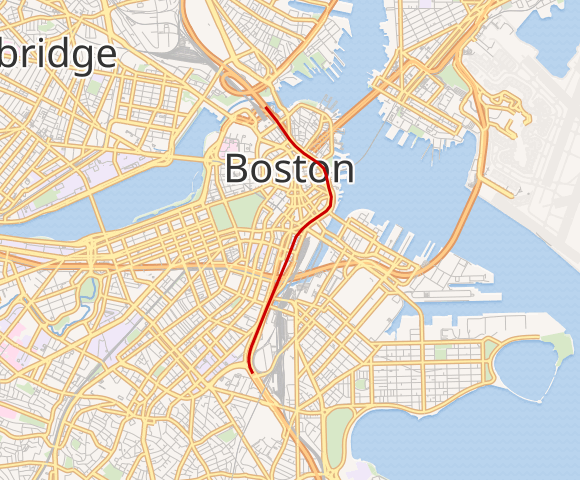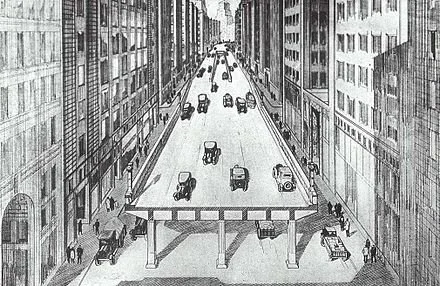
‘Oh what a town to get lost in’
Central Artery is in red.
1920 plan for the Central Artery.
Adapted from Robert Whitcomb’s May 22 “Digital Diary,’’ in GoLocal24.com
I drove up through Boston to Medford, Mass., on May 22 to have dinner with a niece, her husband and their son (8) and daughter (11). I did so with some trepidation because Boston and its inner suburbs have such tangles of streets and bad/confusing/nonexistent signage that GPS often can’t handle it in any coherent way and maps on paper tend to be outdated. And indeed, it was tough to find the restaurant on the Fellsway.
“Boston, Boston, Boston/Oh what a town to get lost in” as an old song goes. I lived in the city in 1970-71, and had jobs there in the ‘60s, and it doesn’t seem to be less confusing than it was back then, whatever the grandeur and promises of the Big Dig projects.
Greater Bostonians, like Rhode Islanders, are infamous for bad driving – not signaling, accelerating without warning on the right, swerving and so on. But the former are worse because they commit these sins at higher speeds.
Having dinner with children, especially bright, engaging ones like the ones mentioned above is fun, but it’s always good to bring games and reading materials for them. Few things are as boring to children as being trapped at a table for a long meal with adults while impatiently awaiting dessert.
At Fenway: Robert Whitcomb (left), the Sox’ Wally mascot and Boston publisher David Jacobs before the May 20 Mariners game.
However confusing Boston is, I tip my hat to the efficiency of the Boston Red Sox. Boston’s biggest weekly paper, The Boston Guardian, on whose little board I sit, was being honored, with other community organizations, in a pre-game event on the field at Fenway Park, on May 20, just before a game with the Seattle Mariners. (Boston won.) I’ve rarely seen such smooth coordination in moving people (including me) onto and off the field for the photo ops, etc.
It was comforting – sort of -- to see the police snipers on the roof of the stadium, ready for a terrorist attack or just another deranged young man with an assault rifle he just bought at Walmart. “Aren’t you happy they’re up there?’’ one of the photographers said.
I had to head back to Providence before the game ended and so had to leave the fancy lounge in the nose-bleed section above Fenway’s stands before Sox and Boston Globe principal owner John Henry showed up and played the guitar for our little group. He’s become my hero for supporting bookstores.
Boston can be beautiful, if exasperating! I fondly remember from the ‘60s running around the still somewhat Dickensian “Hub’’ on job errands, many of which I’d volunteer for to get out of stuffy offices, first in a shipping company on the waterfront and then at the gritty tabloid newspaper the Record American. I’d go to the tiny local stock exchange to pick up the day’s trading records or to the glorious State House to get something from a politician or a bureaucrat and nip into an ice-cream shop (or, as they were often spelled then, shoppe) for myself and into tobacco stores to buy cigarettes and cigars for my older co-workers. Occasionally I’d pick up a bag of peanuts to feed the rapacious pigeons on the Boston Common.
I did most of this walking, which is far and away the best way to get around the city.
The sub on the street
A captured Axis submarine is pulled down Tremont Street, in downtown Boston, in 1942 as part of a “Buy War Bonds’’ rally. President Trump would have loved this!
Thanks to our colleague David Jacobs of The Boston Guardian for forwarding this to us.
Newspaper bats 1000 at Fenway
The Boston Red Sox honored David Jacobs and Gen Tracy, my friends and colleagues at The Boston Guardian, and their very able staff, on June 15 in a pregame ceremony at Fenway Park. As everyone knows, The Guardian is a mighty force for civic virtue, high (sometimes) civilization, relentless reporting and droll humor. All hail great newspapers, especially the ones still on paper. Mr. Jacobs is the publisher/editor and Ms. Tracy is the associate editor. The plaque that the Sox gave them is below.
In other good news, the Sox beat the Orioles that night 6-4.
-- Robert Whitcomb
There's still plenty of life in newsprint: Welcome The Boston Guardian
The Boston Guardian, a new weekly newspaper that’s the successor to the recently closed Boston Courant, has come out with its first edition. The paper serves Boston’s downtown, Back Bay, Beacon Hill and Fenway neighborhoods and will soon expand circulation into the booming Seaport District.
The profitable Courant had a hefty circulation of 40,000 and The Guardian will probably do at least as well. While it has a somewhat different design than The Courant it will cover the same sort of topics, especially development and politics. I hope that they also do more profiles of the many curious characters who live and/or work in their circulation area, one of the world’s most stimulating urban centers.
David Jacobs is the editor and publisher and his wife and longtime business partner, Gen Tracy, is the associate editor of the new paper – the functions they had as The Courant’s owners. Jennifer Maiola is the managing editor of the new paper, as she was of The Courant.
Neither Mr. Jacobs nor his wife own The Guardian. Rather, a group of investors have capitalized it to let the couple and their colleagues continue to serve their community. {Disclosure: The duo are friends of mine, and I have long admired their commitment to community journalism, not to mention their ingenuity, good humor, civic courage and resilience.}
Mr. Jacobs and Ms. Tracy have gotten a lot of attention for deciding to push back against the idea that all print publications must have a Web site. They have come to see such sites as just sucking money, energy and attention from the profitable print product, which, in any event, their readership prefers over staring at screens for coverage of their neighborhoods. And of course Web sites, as wonderful as they can be, are also fertile ground for cut-and-paste plagiarism of copyrighted journalistic work.
The Courant was closed on Feb. 5. In what many legal and media observers saw as an outrage against justice, The Courant lost a wrongful-termination suit from an executive hired to help increase advertising sales.
Mr. Jacobs said that the judgment with interest grew to about $300,000, with $250,000 in legal fees, forcing the couple to shut The Courant and liquidate its assets.
But The Guardian will now take up where The Courant left off as a source of rigorous, useful and often entertaining reportage about the heart of Greater Boston.
-- Robert Whitcomb








